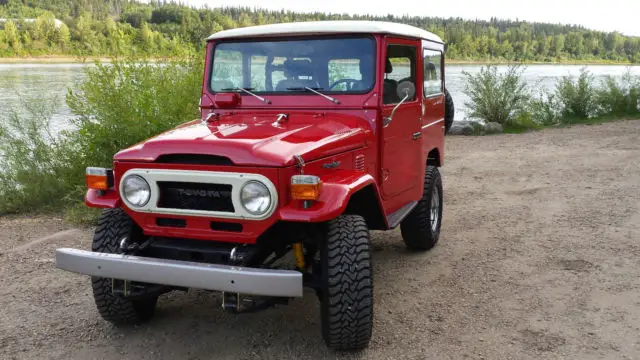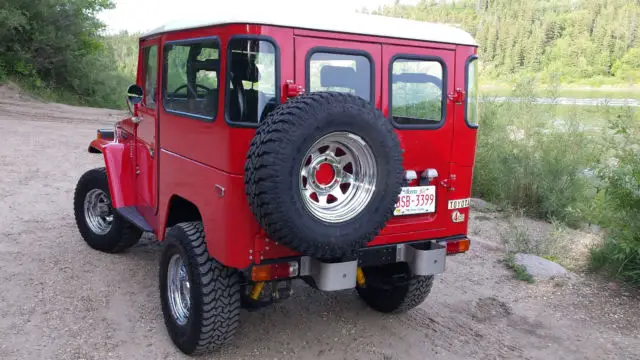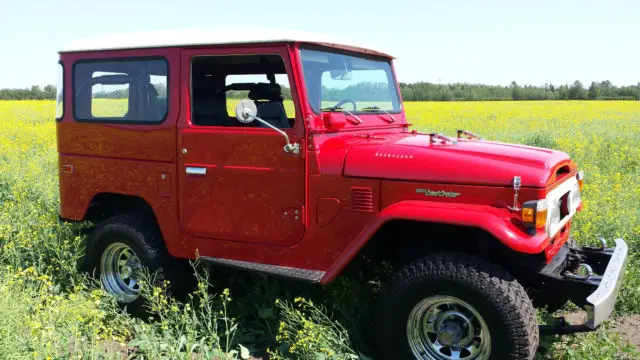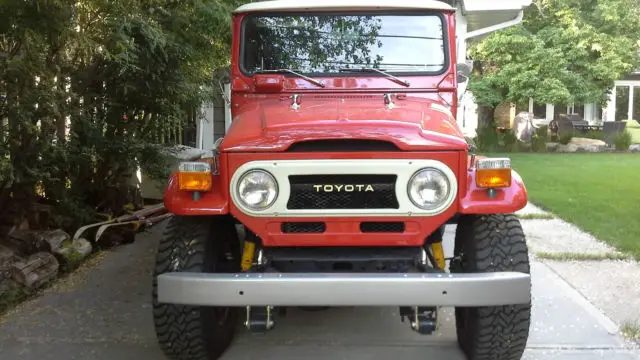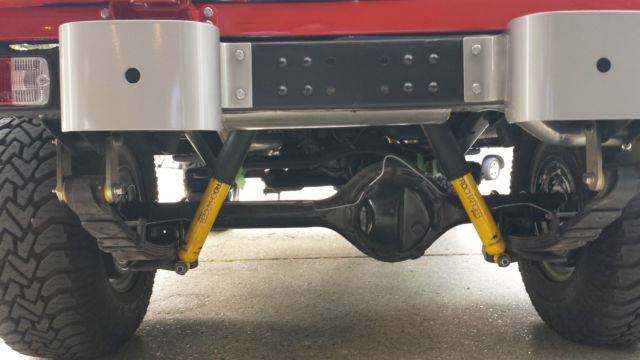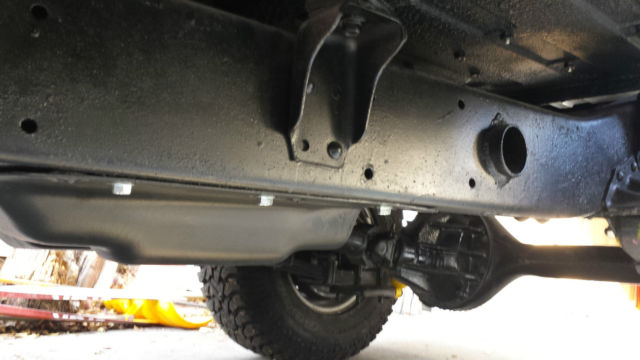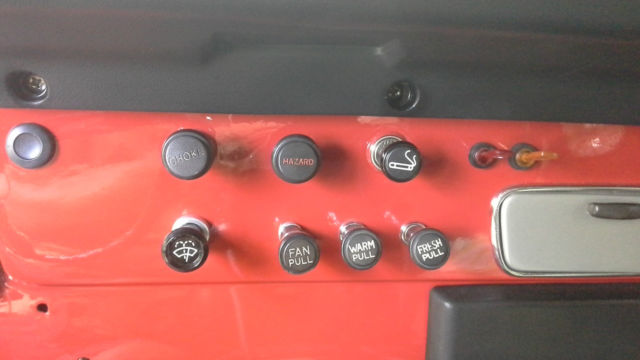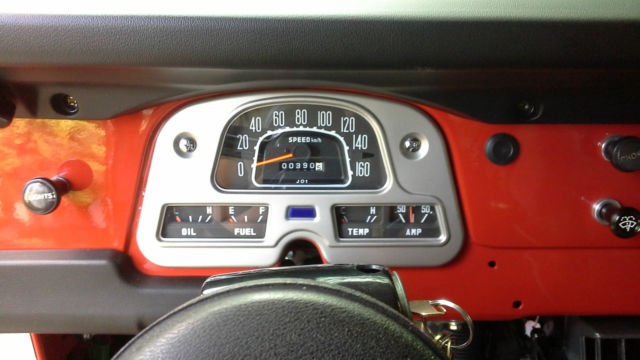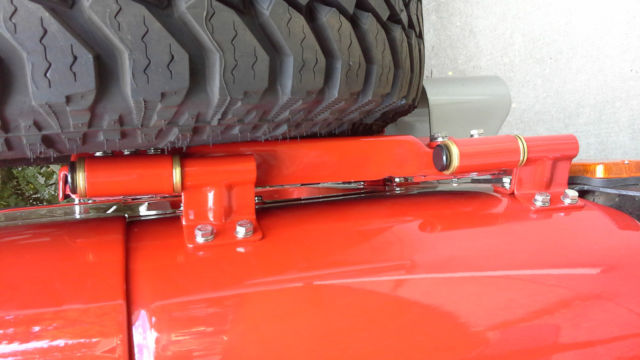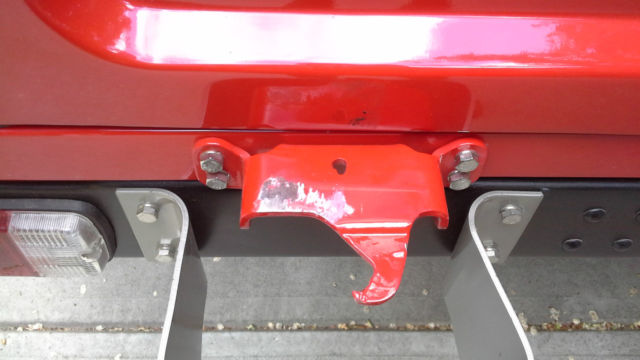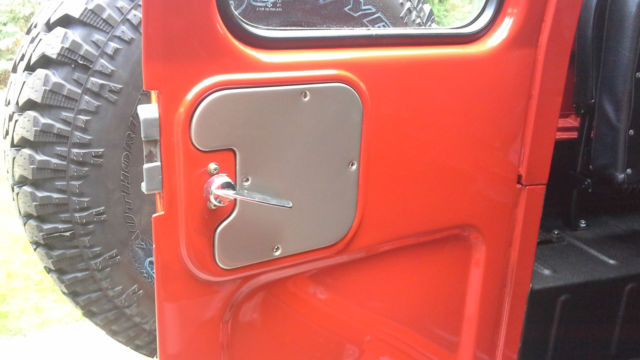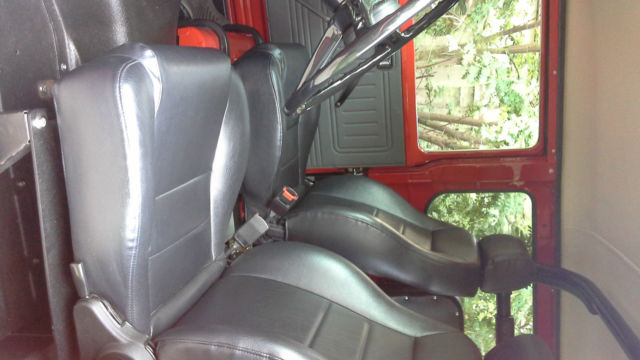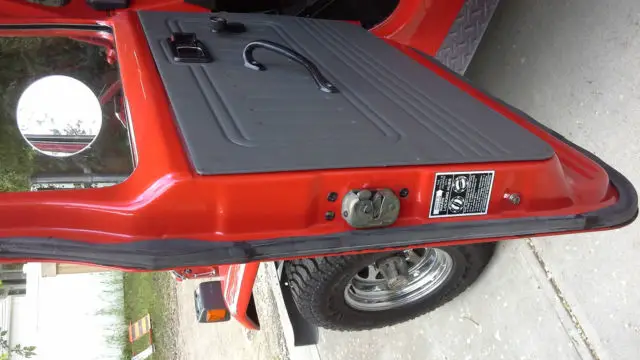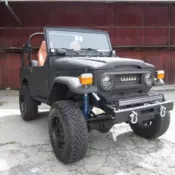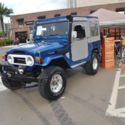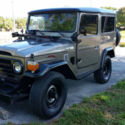1976 Land Cruiser FJ40
| Make: | Toyota |
| Model: | Land Cruiser |
| Type: | SUV |
| Trim: | Base Sport Utility 2-Door |
| Year: | 1976 |
| Mileage: | 250 |
| VIN: | FJ40224445 |
| Color: | Red |
| Engine: | 4.2L 4227CC l6 GAS OHV Naturally Aspirated |
| Cylinders: | 6 |
| Fuel: | Gasoline |
| Transmission: | Manual |
| Drive type: | 4WD |
| Interior color: | Black |
| Vehicle Title: | Clear |
| Item location: | Edmonton, Alberta, Canada |
1976 Toyota Land Cruiser Additional Info:
This is a beautifully restored 1976 FJ40 that took the better part of 15 months to complete and appraised at over $80,000. I purchased it un-restored in Nogales, AZ where it at served duty for over a decade on a cattle ranch. The previous owner said this had always been a southern AZ vehicle. It had absolutely no rust on it anywhere and that’s why I purchased it. Even the frame rails and underside had no flaking or rust and were bone dry. It was in running/roadworthy condition and was driven from Nogales to my home in north Phoenix without issue, albeit painfully slowly, as these are not highway cruisers. My intent was to purchase and restore one to showroom condition and this project got whatever it needed.
Camelback Toyota in Phoenix did the brunt of the restoration. I did the tear down and some of the final trim and interior finish but they did all the mechanical, electrical, and body work.
This list of items replaced is too numerous to detail but I’d be happy to share the receipts from Cruiser Corps and other suppliers with the buyer. Only OEM parts were used. Here’s a list of the major items done:
Body
- Painted Freeborn Red/Cygnus White, its original colours.
- All door latches/strikes replaced
- Ambulance door handles replaced inside and out
- Front bumper replaced
- Front bumper gussets added (missing)
- Rear bumperettes added (these were missing)
- Side mirrors added
- Windshield replaced
- Wiper motor, mechanism, and cover replaced
- Hood windshield hooks and cushions replaced
- Hood latches replaced
- All emblems replaced
- Front turn signals replaced
- Rear turn signal lenses replaced
- Rear side marker replaced.
- License plate light hoods and assembly replaced.
- Door limiters replaced
- Driver and passenger doors replaced with perfect donor ones from Nevada (mine had been warped/twisted enough to cause misalignment). There is a tiny dent from the inside out right above the driver lockset that happened when I was using a screwdriver to tap out the door lock cylinder retention clip.You have to look hard to find it. I could have killed myself when the screw driver slipped. Almost cried. Camelback had put on the Nevada doors and lock cylinders. I had wanted them to put on the original lock cylinders since the keys matched. I was taking out the cylinders they put in and putting in the correct, original ones.
- All door, all window, lower tub to upper tub, and roof seals replaced
- Window felt channels and felt surround channels replaced
- Kick vent doors/springs replaced
- Spare tire carrier hinge bushings custom fabricated from brass, but not before putting a few miles on it and having it bounce around and friction. Hence, you’ll notice some paint damage on the latch mount receiver. This can’t be seen when the carriers is in the closed position and it no longer frictions with the new brass bushings. If I kept the vehicle, I’d coat this piece in Rhino liner.
- All door hinges and hood hinges replaced
- Door lock gaskets replaced
- Ambulance door lock replaced
- Apron bib hinge holes were filled in by the body shop before I was able to source a bib hinge so that is missing, as a FJ40 purist would notice in an instant.
- Running board Rhino-lined (I know, I lose concours points for this but painting them as per the factory and then stepping all over them made no sense to me).
- The vehicle had been painted (poorly) once before (perhaps more than once, I’ll never know). When Camelback stripped the tub, the found evidence of a previous repair to the RR corner. It had been repaired well and but Camelback had taken everything down to bare metal again.
- All new nuts ad bolts using bolt kits from Cruiser Corps were used throughout.
- The underside was painted with POR15 rust inhibitor coating and then sprayed with 3M Ultra Shutz rubberized corrosion protection coating.
Interior
- It had seats from a GMC product with custom fabricated rails. I took these out, obviously, and sourced factory low-back seats intending to re-upholster those. But since those didn’t have an adjustable rail, in the end, I opted for Bestop high-back seats, reclining and sliding, from Cool Cruisers of Texas (CCOT).
- 3 point shoulder belts from CCOT added.
- Jump seats upholstered, including new padding, to match Bestop seats. Retention straps added. Driver side doesn’t have foot pegs mounted yet (as you might have noticed in the pictures). I have the two foot pegs for that side and the other side already has them mounted).
- Jump seat frames were powder-coated.
- The roll cage is fine but I wish I had had it powder coated, too. It was not refinished but had been covered in foam and wrapped in electrical tape somewhere in its history!
- Centre console added.
- Steering wheel centre logo button painstakingly hunted down and added (previously missing).
- Steering wheel professionally restored to better than original a fellow who specializes in restoring bakelite wheels. $900 well spent dollars to finish off the interior properly.
- Steering wheel cover replaced.
- Turn signal assembly replaced.
- Heater lever knob replaced after a 1 year hunt!
- Heater duct work was missing and replaced (with used ones as new ones are not to be had).
- Upper dash pad and knobs replaced.
- All knobs replaced where possible (these are exceptionally hard to find so there’s a mix of new ones and the original ones).
- Radio cutout had been widened over the years for an aftermarket stereo. I had it filled in with a steel piece. In the course of finishing that, Camelback filled in one of the holes for the lower dash pad pins. I have the lower dash pad for the right side of the steering column but the filled-in hole needs to be drilled out again).
- Instrument cluster replaced with a brand new one in metric. I had intended to use the vehicle in Canada (where I live) for Sunday cruises. That’s why the odometer shows under 400km. I have the original cluster. It showed 65xxx miles which is likely 165xxx, given the shape of the body and drive train when I bought it.
- You’ll notice two rocker switches on the dash photos. This is wiring for heated seats which was on the agenda once but went out the window when the Bestop seats were decided upon. The wiring is tucked up on the dash for whatever purposes you might have for additional switches.
- The glove box door was replaced and painted to match cluster as someone had drilled a hole and mounted a lock. I kept the original 4WD instruction plaque.
- Ashtray and face plate replaced and painted to match cluster.
- Shift knob, transfer case shift knob, and shift boot replaced.
- Rear view mirror replaced.
- Visors and headliner replaced.
- Proper, factory dome light added
- Gas tank and rear heater painted.
- Door panels replaced.
- Entire tub Rhino-lined.
Drivetrain
- Pulled out entirely and given the once over.
- Old Man Emu 2” Dakar lift including shocks and shackles added to prevent the rear-end sag these vehicles had.
- This included the steering damper.
- Clutch slave/master replaced.
- Brake drums/cylinders and all brake lines replaced.
- Tie-rod ends replaced.
- Hubs rebuilt just in case.
- Steering rack rebuilt.
- It now doesn’t have the road wonder it used to!
Engine
- Water pump and thermostat, alternator, starter replaced.
- Carb rebuilt.
- Radiator replaced.
- Valve cover polished.
- Firewall grommets replaced.
- Heater control valve replaced.
- Engine gasket kit installed.
- Washer jet nozzle, pump, and reservoir replaced.
- All electrical hacking over the years was removed and corrected. I must have pulled out 400ft of speaker and CB radio wiring myself!
- The only ‘ugly’ in the engine is the ignition coil. Camelback tried to put in electronic ignition but that didn’t pan out with what they had so the reverted to the original configuration but needed a coil. They sourced a rusty one that needs refinishing.
- Camelback estimated that the engine had been rebuilt 5000 miles or less before I got it so the lower engine wasn’t rebuilt. The valve train was rebuilt.
- New custom bent exhaust and hangers from manifold back.
- New Toyota battery, of course.
Overall
No expense was spared restoring this rig. I’m a Land Cruiser aficionado and had wanted a FJ40 for some time and to restore it to showroom condition. It’s an excellent restoration but it’s not museum quality but it’s darn close. Everything works on it and nothing leaks. It’s in perfect running order. In my opinion, there are two types of car owners: drivers and curators. I’m a curator. I drive my cars sparingly and carefully. With a few more cars in the stable now, I’ve run out of space and this vehicle it’s too nice to store outdoors, even under cover. It’s never been rained on or driven in the rain since it was put back into service in July 2015.
More pictures can be found at
https://www.dropbox.com/sh/s476e9tdhbg0iog/AADYWfVlXxhql4uOPTYcxrb5a?dl=0
We split our time between Phoenix and Edmonton, Alberta. I exported it from the US and shipped it to Canada in July of 2015. It can be repatriated to the US without any issues. I can assist the buyer with transportation arrangements.
Thanks for looking.
